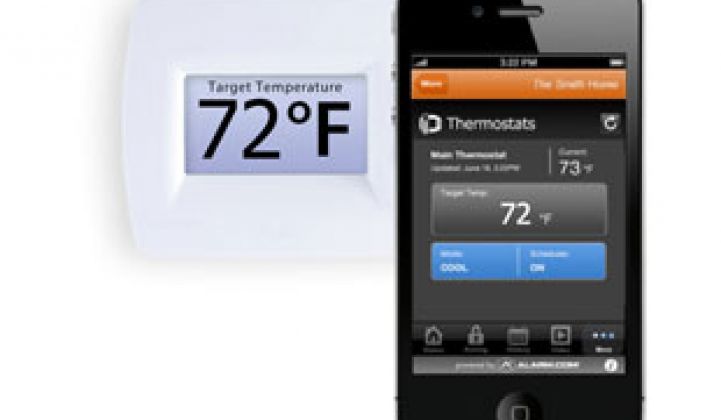Alarm.com has acquired the home energy management startup EnergyHub. The security company has been moving further into connected home offerings in the past few years, and raised $136 million last year to expand the business.
Alarm.com and EnergyHub were already working with utilities like San Diego Gas & Electric so the utility can leverage customers in its territory for demand response programs.
“As we go after larger utility programs, we’re now representing a larger, more resourceful entity,” said Seth Frader-Thompson, president of EnergyHub.
EnergyHub will continue to operate as an independent company within Alarm.com.
“We believe that EnergyHub’s Mercury platform provides the best available solution for powering comprehensive residential demand response and energy efficiency programs,” Steve Trundle, CEO of Alarm.com, said in a statement.
Alarm and telecom companies are poised to take hold of the home energy management space, as they already have a relationship with customers and can bundle a suite of connected home products. Energy efficiency, by itself, is a pretty dull sell, but packaged with convenience, comfort and safety, the proposition gains appeal.
Alarm.com is also a key partner of Vivint, another of the country’s larger home alarm companies. Vivint recently expanded into third-party-financed residential solar. Earlier this year, Vivint lined up $75 million for its solar business. Although Alarm.com doesn’t plan to get into the solar business, it can support solar panels. “When you look at the connected home,” said Jay Kenny, VP of marketing at Alarm.com, “it becomes more valuable the more devices you can connect.”
One of the fastest-selling devices is the thermostat, said Kenny. The company has well over 1 million customers, hundreds of thousands of which are using thermostats that run on EnergyHub’s Mercury platform. When EnergyHub goes to large utilities to sell its services for residential demand response, “We now have a utility-grade balance sheet,” said Frader-Thompson. The company was one of the first to talk about leveraging existing thermostats in a utility’s territory for load programs, “and this is a huge extension of that,” he added. Other companies like Nest, Honeywell and Carrier are also looking to partner with utilities to leverage thermostats they've already sold.
The Brooklyn-based startup will maintain relationships with its other partners, such as Radio Thermostat of America, which uses the Mercury platform for its wireless thermostats.
Terms of the deal were not disclosed, but EnergyHub has raised about $19 million to date.



